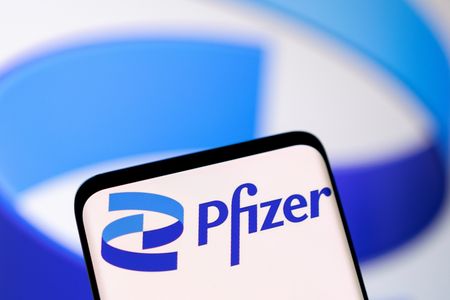By Michael Erman and Bhanvi Satija
(Reuters) -Pfizer reported a surprise quarterly profit on Tuesday, helped by cost cuts and higher-than-expected demand for its COVID treatment Paxlovid, but sales of some high profile products fell short of Wall Street estimates.
Pfizer shares were off around 1% in afternoon trading.
Investors fled Pfizer last year as pandemic worries declined and billions of dollars in COVID-19 vaccine and treatment sales disappeared. The company has responded with a recent purchase of cancer drugmaker Seagen, a $4 billion cost-cutting program, and internal restructuring.
“This will be a year of execution. We have assembled a team that I hand-picked, that I believe are the absolutely right leaders to” put Pfizer’s growth plan into place, Chief Executive Albert Bourla said on a call with investors.
“Our abilities to execute across all our operation are proven,” Bourla said in an interview, pointing to the company’s success developing its COVID-19 vaccine and treatment.
Pfizer has forecast 2024 revenue in a range that is flat to up 5%.
The company has not said how many people it will lay off as part of the cost reduction program, but has announced over a thousand job cuts in locations including the UK, Ireland, Michigan, New York and New Jersey.
Jeff Jonas, portfolio manager at Gabelli Funds, said he was concerned about the company’s non-COVID performance, after revenue for products like breast cancer treatment Ibrance and the Prevnar pneumonia vaccine were lighter than expected.
“Historically I thought they had one of the best sales forces in the industry and they’ve been able to at least sell and execute on drugs pretty well, even if their R&D maybe wasn’t always the best. But there have been some challenges there recently,” Jonas said.
Ibrance, which is facing intense competition from rival treatments, saw sales fall 12.6% to $1.12 billion in the quarter, below analysts’ forecasts for $1.23 billion.
Prevnar brought in sales of $1.61 billion, below estimates of $2 billion.
Bourla said the company was looking to leverage a “more focused, efficient structure” to drive growth of new drugs. The CEO previously expressed disappointment over the launch of the new RSV vaccine Abrysvo, which has significantly trailed a rival shot from GSK.
The New York-based drugmaker earned 10 cents per share on an adjusted basis for the fourth quarter. Analysts on average had expected a loss of 22 cents per share, according to LSEG data.
Revenue in the quarter of $14.25 billion was shy of Wall Street estimates of $14.42 billion.
The company maintained its 2024 forecasts of $2.05 to $2.25 per share in adjusted earnings, and revenue of $58.5 billion to $61.5 billion.
Revenue from COVID products, the Paxlovid antiviral treatment and vaccine Comirnaty, came in at $12.5 billion for 2023, meeting the company’s own targets for the year, but a far cry from the $57 billion peak racked up in 2022.
Pfizer in October renegotiated a contract, allowing the U.S. government to return unused Paxlovid inventory. The company recorded a smaller-than-expected $3.5 billion revenue reversal in the quarter as the U.S. returned about 6.5 million treatment courses. It had previously forecast a $4.2 billion revenue reversal based on the expected return of around 7.9 million courses.
A Pfizer spokesperson said there had been more use of the two-drug treatment than it had forecast. Still, the window for U.S. government Paxlovid returns remains open, and the company could take another financial adjustment in the current quarter.
That includes a $3.1 billion contribution from Seagen and $8 billion in sales from Paxlovid and the COVID vaccine it shares with German partner BioNTech.
Pfizer has been slashing research and development spending as part of its cost cut program. R&D expenses were down 22% in the quarter to $2.82 billion, driven by lower compensation spending, as well as reductions in its vaccine and rare disease programs.
Pfizer Chief Financial Officer David Denton said that due to timing of certain costs, some of the R&D spending that was expected in the fourth quarter may slide into 2024 and 2025.
(Reporting by Bhanvi Satija and Sriparna Roy in Bengaluru and Michael Erman in New York; Editing by Sriraj Kalluvila and Bill Berkrot)

